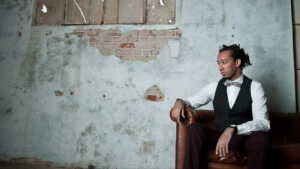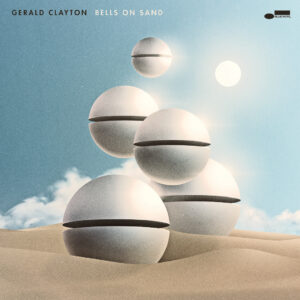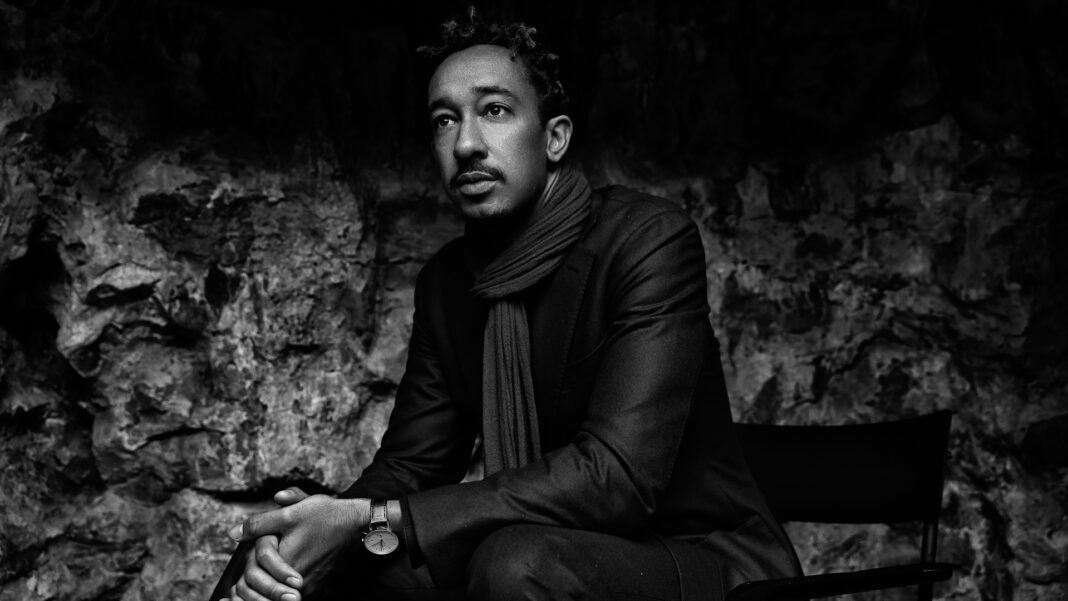
“Gone are the days of releasing a record with a particular band and go right on the road with the same band for months at a time, plugging that music, plugging that album, playing that music, right? I look at every tour, every gig, every musical situation I have on my calendar and I just think what would make this as enjoyable an experience as possible for the band, for me and for for the audience. What can I do to make this what it needs to be?” So says pianist/composer Gerald Clayton when discussing how to approach the upcoming release of his new album, Bells on Sand.
Before Clayton’s album is released by Blue Notes Records on April 1st, he has a few concerts lined up. On February 17th he’ll be performing at The Soraya in Northridge. On February 25th Clayton will be at the Starlight Patio and Lounge with Domo Branch in Portland. After Bells on Sand comes out he’ll be at the Johnson Theatre in Durham, New Hampshire. Clayton is also part of three all-star concerts celebrating Nat “King” Cole with the Nashville Symphony.
Clayton is an immensely talented artist who gives considerable thought to who he is artistically and the traditions from which his career was possible. We spoke last week via Zoom to talk about Bells on Sand, those artists who inspire him and whether or not he is an old soul. What follows are excerpts from our conversation that have been edited for length and clarity.
You said that Oscar Peterson’s Night Train was the first jazz album that really got its hooks into you. Peterson once said, “I don’t believe that a lot of the things that I hear on the air today are going to be played for as long a time as Coleman Hawkins records or Brahms concertos.” What are the challenges you face as a composer and a musician cutting through all the music that is available now and at the same time creating something that may last as long as a Coleman Hawkins record or a Brahms concerto?
That’s a really beautiful sentiment and fascinating to think about. One of the parts of the premise of that question is that I consider all of the music around me to cut through in the first place. Maybe the way to go about arts and making music is to to drown out all the other noise and really set your sights on that bull’s eye, on that North Star. Just serve the art, serve the music as best as you can, as honestly as you can, as diligently and thoughtfully and thoroughly as possible, and let the rest take care of itself. I think that’s generally the equation that been the modus operandi for me since I was a kid.
I think it’s natural that we all sort of aspire to leave something behind, to be so lucky as to to make music that is great and magical and wonderful enough that it even deserves to live on after we’re long gone. I think part of the allure of that is this very human desire to have your ego remain you’re gone. But to experience music and experience art that is that pure and worthy of that is really what excites me and is something that I’m inspired to try to get to. Just to even record something on the level of those artists you mentioned would be incredible.

At the same time I was first listening to Bells on Sand I was listening to Joel Ross’ new album, The Parable of the Poet and Ethan Iverson‘s new album Every Note Is True. One thing that struck me about all three albums was that there was a sense of calm that I heard in the music that I don’t think I’d been hearing in the last few years. They’re all coming out around the same time and reflect more of a coming to peace with one’s self or one’s world. Is that something that you wanted to express in this album, particularly after all that we’ve gone through as a society recently?
I think you’re probably onto something. I think there’s an affect from this wildly new time that we’re living in that is maybe hard to fully comprehend at this moment. Maybe it takes another couple of years to look back and see that all of the music coming out at this time all had this in common. Maybe it’s that sort of calm sensibility or what have you. It could also be just individual paths and journeys of all three of us. For me this record is also a reflection of where I am in comparison to the previous records I put out and feeling that it was time to include something that’s a little bit more intimate in my body of work.
This is an intimate record. What the title and narrative of the project is trying to get after is to play music without anything else. Just have a song and that sort of catharsis, that therapeutic relationship with you and the sound and how that’s just a thing that happens in a moment. And then you go on to the next moment. And if you come back to the same song it’s a new moment and the sands have shifted. To point that all back to the sensibility of calmness and and meditation feels very relevant.
If we were to take Boogablues, which opens your first album, Two-Shade, and then take Water’s Edge, which opens Bells on Sand and use them as goalposts at opposite ends of the field, what does that say to you about the journey that you’ve taken and who you are today versus who you were then?
There are different ways to to take people on a musical journey and I think that’s something I’ve had the privilege of exploring over these past 15-20 years of doing this. To see what it feels like to open the concert with a dance like Boogablues, then what comes after that? How does it feel to actually start not with the jovial sort of bouncy attitude feeling of Boogblues, but start with a little bit more of a pensive or intellectual or cerebral [composition]? Going there first and then taking them to the blues as sort of a release from that tension to end a set big or to end a set on a ballad. I like the variety of things and I definitely don’t have one way of doing things. That’s what always turns me on about art and music. I suppose it says that maybe it would be strange to start your first record, your first statement to the world on a ballad, you know? But now that I’ve got plenty of baggage that I take along with me to this next record, I think I feel the freedom to go there and to start on this energy.
Looking back on Ben Ratliff‘s New York Times review of the first night of your first stand at the Village Vanguard in 2010 he said, “Perhaps because he inherited* so much aesthetic knowledge, Mr. Clayton seems from a different era.” Do you feel like your are from a different era or are an old soul?
I think there’s something about being a 1984 baby that maybe our generational purpose is one of connecting past to future. That we are the last of that soulful generation that remembers being social before the internet. So yeah, there are values and lessons from the before times that are really near and dear to my heart that I think are actually really important.
I think there are plenty of other people my age and younger who feel that as well and want to be about carrying that torch forward. But there are plenty who don’t have that connection and are still amazing, creative, beautiful artists that I love to work with. So maybe compared to some of those cats I am maybe a different kind of old soul. But really I think it’s just the same as anybody else, just trying to play what what feels right and be honest about the things you think are beautiful.
Legendary drummer Billy Higgins once said. “Because the stuff that they feed kids now, they’ll have a bunch of idiots in the next millennium as far as art and culture is concerned.” I think he’s been more than proven wrong twenty-one plus years into this century. But what would you say to him if you had a chance to respond to that comment?
I won’t really say anything. I listen and I take note and I say, I hear you Maestro. I’m really lucky to to work with Charles Lloyd who had that very deep connection with Billy Higgins. He talks about Billy a lot. Hearing him talk about life and music, the things that are and the things that aren’t, I love that. Just soaking that up and really ruminating on it and and making sense of it for yourself. I think that’s one of the gifts of this music is that community and the voice of the elders. I think part of the responsibility of my generation, and really probably anybody’s generation, is to take those lessons that those elders have to say and make sense of them for yourself and bring them forward and try to do do them justice and consider them as you move forward.
Without getting too cynical there’s a lot about this time we live in that feels a bit like smoke and mirrors. That the focus has maybe shifted. It’s not necessarily about the quality, maybe it’s more about the quantity. Without being too judgmental or critical a lot of this stuff is not that great. So I guess what happens as a result of that might be speaking to what Maestro Higgins was talking about. You create a whole audience of viewers and listeners that don’t have that same bar of expectation of what something could be or should be or needs to be for it to be considered good. I hear him on that. I also agree with you that there is something about this about music and about art that is much bigger than the dialects of the language. It is human creativity and this actual need for people to express their joys and their sorrows in a creative way. That never dies.
*Gerald Clayton is the son of jazz musician/composer John Clayton and nephew of the late jazz musician Jeff Clayton.
Photo: Gerald Clayton (Photo by Ogata/Courtesy Blue Note Records)











